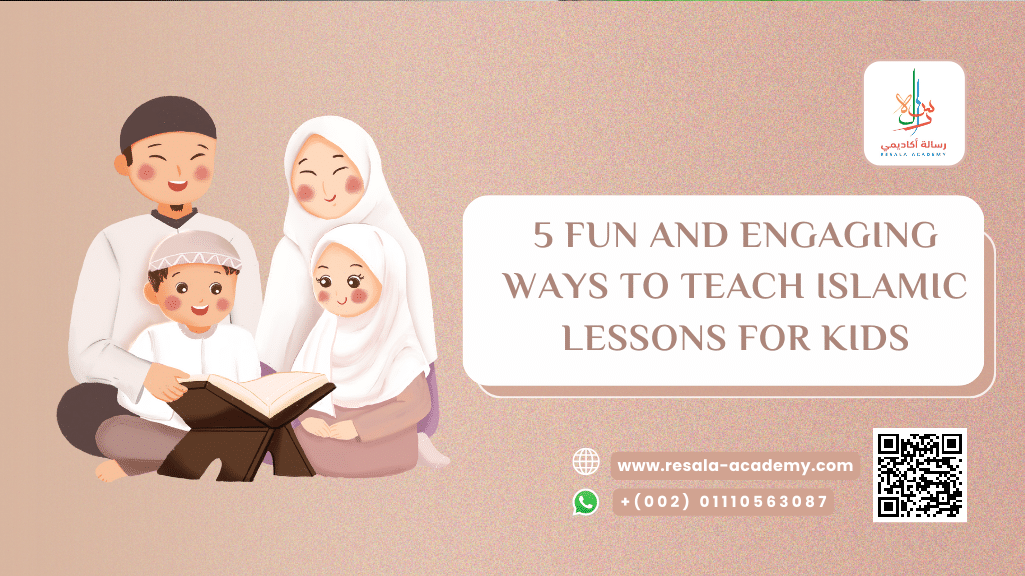Table of Contents
5 Fun and Engaging Ways to Teach Islamic Lessons for Kids
Welcome to our blog post on 5 Fun and Engaging Ways to Teach Islamic Lessons for Kids! Instilling Islamic values and teachings in children from a young age is crucial for their spiritual growth and development. In this article, we will explore creative methods that make learning about Islam enjoyable and interactive for kids. From storytelling to arts and crafts activities, there are countless ways to engage young minds while imparting essential lessons about faith, compassion, and community. Let’s dive in!
Why it is important to teach Islamic Lessons for Kids
Teaching Islamic Lessons for Kids is essential for nurturing their spiritual and moral development. By introducing children to the teachings of Islam at a young age, we lay a strong foundation for their understanding of faith, ethics, and values.
– Development of Critical Thinking: Islamic teachings encourage children to think critically and analyze information, fostering problem-solving skills.
– Guidance in Decision Making: Learning about Islamic principles helps children make sound judgments based on moral values and ethical standards.
– Promotion of Tolerance: Islamic studies promote tolerance and understanding of diverse beliefs, fostering respect for others.
– Nurturing a Strong Muslim Identity: Teaching Islamic lessons helps children develop a strong sense of their Muslim identity and values.
– Connection to Faith: Studying Islamic texts and teachings deepens children’s connection to their faith and spirituality.
– Cultivation of Moral Compass: Islamic lessons provide children with a moral compass, guiding them to make ethical choices in life.
– Educational Enrichment: Integrating Islamic education offers children a well-rounded education that includes spiritual and moral teachings.
– Community Engagement: Understanding Islamic lessons encourages children to engage positively within their community and contribute to society.
– Preparation for Adulthood: Learning Islamic lessons equips children with the knowledge and values needed to navigate adulthood with integrity and compassion.
– Fostering Love for Religion: By teaching Islamic lessons, children develop a love for their religion and a desire to continue learning and growing in their faith.
Use interactive storytelling to engage young minds
Interactive storytelling is a powerful tool to capture the attention of young minds and make Islamic lessons come alive in a fun and engaging way. By incorporating characters, narratives, and visuals, children can easily connect with the teachings on a deeper level.
Using props like puppets or costumes can enhance the storytelling experience and create a memorable impact on kids. Encouraging them to participate by acting out scenes or retelling stories themselves can further reinforce their understanding of Islamic concepts.
Interactive storytelling also allows for discussions and reflections after the story ends. This helps children process what they’ve learned and apply it to their own lives. It fosters critical thinking skills while promoting moral values taught in Islam.
Interactive storytelling serves as an effective method to spark curiosity, instill empathy, and build a strong foundation of Islamic knowledge in young hearts.
Incorporate Islamic teachings in everyday activities and chores
Incorporating Islamic teachings in everyday activities and chores is a great way to immerse children in their faith. Start the day with Bismillah before meals, emphasizing gratitude for the sustenance provided by Allah. Encourage kids to recite small duas while performing daily tasks like brushing their teeth or getting dressed, instilling the habit of seeking blessings throughout the day.
Use household chores as opportunities to teach responsibility and cleanliness, linking these values back to Islamic teachings on hygiene and respect for one’s environment. For example, tidying up toys can be framed as showing appreciation for what we have been blessed with and taking care of our belongings.
When cooking together, discuss the importance of halal ingredients and how consuming permissible food aligns with Islamic dietary laws. This not only educates about food choices but also reinforces mindfulness about what goes into our bodies according to Islamic principles.
Make use of educational games, apps, and videos
Incorporating educational games, apps, and videos into your child’s learning routine can make Islamic lessons fun and interactive. There are numerous resources available online that cater specifically to creatively teaching Islamic teachings.
Interactive games not only entertain kids but also help them retain information better through hands-on learning experiences. Apps designed for Islamic education often include quizzes, stories, and activities that engage young minds while imparting valuable knowledge about the religion.
Videos can be a great tool to visually explain complex concepts or historical events in Islam. Children are naturally drawn to visual content, making videos an effective medium to capture their attention and spark curiosity about different aspects of the faith.
By incorporating these digital tools into your child’s educational journey, you can create a dynamic learning environment that encourages exploration and understanding of Islamic principles in a modern context.
Organize fun and creative arts and crafts activities related to Islam
Engaging kids in fun and creative arts and crafts activities related to Islam is a fantastic way to make learning enjoyable and memorable. You can encourage children to express their creativity by making Islamic-themed artwork such as colorful prayer rugs, lanterns for Ramadan, or even handmade Eid decorations. These hands-on projects not only enhance their artistic skills but also deepen their understanding of Islamic traditions.
Another exciting craft idea is creating Arabic calligraphy art pieces that feature verses from the Quran or Hadiths. Children can explore the beauty of the Arabic language while reflecting on the profound meanings behind these sacred texts. Additionally, crafting items like crescent moon mobiles or masjid models allows kids to visually connect with symbols of Islam tangibly.
By incorporating arts and crafts into Islamic lessons, you provide children with a holistic learning experience that stimulates their imagination and strengthens their bond with their faith. Whether it’s painting, sculpting, or designing these creative activities foster a sense of pride in one’s cultural heritage while nurturing a love for Islam through artistic expression.
Plan family field trips to Islamic landmarks or events
Exploring Islamic landmarks and events can be a fantastic way to immerse kids in their faith. By planning family field trips to mosques, museums, or cultural events, children can witness the rich history and traditions of Islam firsthand. Visiting these sites can make learning about Islamic teachings more tangible and memorable for young minds.
A trip to a local mosque offers the opportunity for kids to observe prayers, learn about architectural features unique to Islamic places of worship, and interact with members of the community. This hands-on experience can deepen their understanding and appreciation of Islamic practices.
Attending cultural events or festivals celebrating Islamic holidays like Eid al-Fitr or Eid al-Adha exposes children to diverse customs and traditions within the Muslim community. These experiences help foster a sense of unity among family members while promoting cultural awareness and respect for different beliefs.
Field trips provide a dynamic learning environment outside the classroom where kids can engage all their senses in discovering new aspects of their faith. Making these excursions fun-filled educational adventures will leave a lasting impact on children’s knowledge and connection to Islam.
Resala Academy Offers Online Islamic Lessons for Kids
Are you looking for a convenient way to teach your kids important Islamic lessons? Look no further than Resala Academy, which offers engaging and interactive online Islamic lessons designed specifically for children.
Resala Academy provides a structured curriculum that covers various aspects of Islam in a fun and educational manner. Through their online platform, kids can learn about Quranic stories, the importance of prayer, the life of Prophet Muhammad (PBUH), Hadiths, and much more.
With experienced instructors who are passionate about teaching young minds, Resala Academy ensures that your children receive a quality education while reinforcing their faith. The online format allows for flexibility in scheduling lessons, making it easier for busy parents to incorporate Islamic teachings into their child’s routine.
By enrolling your child in Resala Academy’s online Islamic lessons, you can provide them with a solid foundation in their faith while fostering a love for learning about Islam.
FAQs
Q: How do I ensure my child stays engaged during Islamic lessons?
A: Use interactive storytelling, incorporate everyday activities, and make use of educational games and apps to keep the learning experience fun and engaging.
Q: What age is appropriate to start teaching children about Islam?
A: It’s never too early to start introducing basic Islamic teachings. Tailor the lessons based on your child’s understanding and curiosity levels.
Q: How can I make sure my child retains what they learn about Islam?
A: Encourage practical application by incorporating teachings into daily chores, arts and crafts activities, and family field trips to reinforce learning outside traditional lesson settings.
Conclusion
Teaching Islamic Lessons for Kids is crucial for their spiritual and moral development. By incorporating interactive storytelling, everyday activities, educational games, arts and crafts, and family field trips into their learning experience, you can make the process engaging and enjoyable for them. Resala Academy also offers online Islamic lessons tailored specifically for kids to enhance their understanding of Islam in a fun and interactive way.
Remember that instilling Islamic values in children from a young age helps shape their character and behavior as they grow older. By making learning about Islam exciting and interactive, you are not only educating them but also fostering a love for their faith that will stay with them throughout their lives. Embrace these creative ways to teach Islamic Lessons for Kids and watch as they embark on a journey of discovery and growth in their faith.




